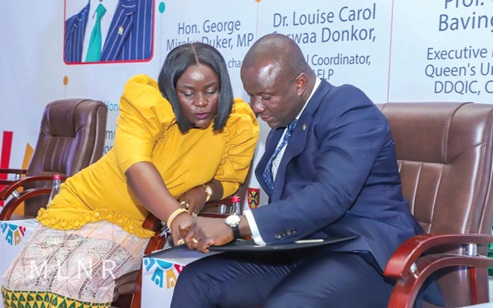
E-Jobs4All to reach 10,000 youth
An entrepreneurship programme targeted at providing employment to over 10,000 youth in nine mining regions of the country has been launched.
The Entrepreneurship Jobs for All (E-Jobs4All), an initiative of the National Alternative Employment and Livelihood Programme (NAELP), is meant to address illegal mining activities.
The programme, which forms part of the apprenticeship, skills training and entrepreneurship module of NAELP, would ensure that the 10,000 young people are trained in modern entrepreneurial skills and supported to build their businesses over a period of five years.
It is being implemented in partnership with the Community and Entrepreneurial Development Initiative (CEDI Ghana), Dunin-Deshpande Queen's Innovation Centre (DDQIC) at Queen's University, Canada; and Leadogo Incorporated, Canada.
The beneficiary mining regions are Ashanti, Western, Western North, Eastern, Ahafo, Central, Upper East, Upper West and Savannah.
The Minister of Lands and Natural Resources, Samuel Abu Jinapor, launched the project in Accra yesterday, with an assurance that the government remained committed to rolling out initiatives that would help to address illegal mining and its impact on the country.
The launch of the initiative brought together all partners, including metropolitan, municipal and district chief executives (MMDCEs) from mining communities.
Criteria
To qualify for the programme, the person must be a Ghanaian youth who resides in or hails from a mining region; operates or aspires to operate a small and medium-sized enterprise (SME); proficient in reading, writing and speaking English, and be prepared to engage in virtual or online training.
The three-stage project (foundation, intermediate and advance) extends over six months, with each stage having a comprehensive and engaging curriculum.
Transformational initiative
Mr Jinapor described the E-Jobs4All initiative as transformational because it was not just a slogan but “a beacon of hope, a catalyst for change and a commendable approach” to addressing unemployment.
“It is an initiative to empower our youth, foster innovation and unleash the potential that lies within our mining communities,” he said.
The minister added that the partnership with other institutions for the project was further testament to the government’s unwavering commitment to providing alternative employment opportunities, particularly for our youth in mining regions,” he said.
Mining communities
Recent data from the Bank of Ghana shows that as of August this year, gold alone contributed $4.67 billion in exports, representing 43.4 per cent of total exports.
Mr Jinapor observed that it was worrying that despite the contribution of mining to the national economy, there was historical underdevelopment of mining communities.
He said through the Minerals Development Fund (MDF) and other alternative livelihood programmes being implemented by the Minerals Commission, mining communities would continue to receive the needed support for development.
The minister added that the government was also engaging with mining companies to ensure that they contributed meaningfully to the development of their host communities.
“That is why under the mining lease granted for the exploitation of some of our lithium resources, we have, in addition to the increases in royalties’ rate and state participation, negotiated for the payment of a one per cent of the company’s revenue into a Community Development Fund to be utilised for the development of communities to be affected by the mining operations,” he said.
Mr Jinapor reassured Ghanaians that the government remained committed to sanitising the small-scale mining industry through the promotion of “responsible, sustainable, viable and environmentally sound mining practices.”
“Let us embark on this journey with unwavering determination, as we carve a path for the transformation of mining communities, and for a more equitable and prosperous Ghana,” he said.
Potential of project
The National Coordinator of the NAELP, Dr Louise Carol Serwaa Donkor, said the E-Jobs4All project was revolutionary and had the potential to address the menace of illegal mining while providing sustainable livelihoods for young people.
She added that the project was a strategic response to the evolving landscape of entrepreneurship, innovation and economic resilience.
"It leverages not only the traditional strength of our mining sector but also integrates cutting-edge practices that align with modern trends and ensures that our youth are equipped to thrive in a rapidly changing world," she said.
The Executive Director of the DDQIC, Canada, Professor Greg Bavington, commended the government for rolling out the E-Jobs4All project because it would touch the lives of persons impacted by the adverse effects of illegal mining.
He called on stakeholders to support the project as it would contribute to halting the menace of illegal mining.
Background
President Nana Addo Dankwa Akufo-Addo launched the NAELP in Tarkwa in the Tarkwa Nsuaem Municipality in the Western Region on October 25, 2021.
Under the programme, 220,000 illegal miners are to be provided with good alternative livelihood options.
The NAELP is hinged on six modules, including national land reclamation and re-afforestation; agriculture and agro-processing and apprenticeship, skills training and entrepreneurship.
In October last year, the National Coordinator of NAELP revealed that the programme had provided jobs to 80,000 people whose lives were dependent on illegal mining and those who were likely to enter that trade.
Dr Donkor said the beneficiaries had been deployed mainly into the land restoration and re-afforestation programme, the first module of the NAELP.
